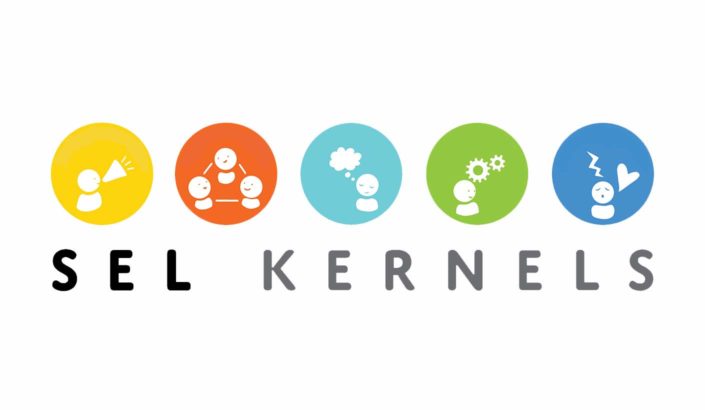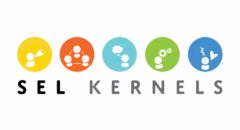What Are Kernels?
Developed by Harvard University’s Ecological Approaches to Social Emotional Learning (EASEL) Laboratory, kernels are specific activities or strategies that are commonly used by research-based programs to support the growth and development of social and emotional skills and competencies.
Kernels have been developed for grades K-6 and include a variety of activity types and instructional methods, such as games, routines, and storytelling. Each kernel includes adaptations and extension activities, as well as grade level differentiations when applicable.
Drawing from EASEL’s content analysis of 25 leading SEL programs, kernels have been categorized into the following constructs: cognitive, emotional, interpersonal, character, and mindset.
Brain Power (Cognitive Skills)
The ability to direct thoughts and actions toward achieving goals.
Cognitive skills help students when they are faced with everyday tasks that require self-control, concentration, planning, problem solving, coordination, or conscious choices between different options. These skills include:
- The ability to control impulses
- Keep track of changing information over short periods of time
- Sustain attention and ignore distractions
- Switch attention between tasks when needed
Feelings Power (Emotional Skills)
The ability to identify, express, and regulate emotions, as well as understand the emotions of others.
Emotional skills are critical to positive social interactions and building relationships with peers and adults. It is difficult for students to have positive relationships with others without the ability to recognize and regulate emotions and to understand others’ perspectives, needs, or feelings. These skills include:
- Emotion knowledge and expression
- Emotion and behavior regulation
- Perspective-taking
People Power (Interpersonal Skills)
The ability to interpret others’ behavior, effectively navigate social situations, and interact positively with peers and adults.
Interpersonal skills help students work cooperatively on a team, solve social problems, and coexist peacefully with others. This is especially important in the classroom where students are learning and working with others, as well as for students’ ability to sustain positive relationships with others. These skills include:
- The ability to understand social cues
- Resolve conflicts with peers
- Promote and carry out prosocial (kind, helpful) actions and behaviors
Citizen Power (Character)
A set of skills, values, and habits that help guide one’s actions.
Character skills guide the choices students make, directly impacting their school and home communities. These skills are essential to functioning in a democratic society, and include the following:
- Making ethical judgements
- Being tolerant and accepting of differences
- Following through on responsibilities, civic engagement, and community appreciation, among others
Attitude Power (Mindset)
A set of attitudes and beliefs about oneself and others.
Mindset skills support students’ abilities to learn, grow, and overcome obstacles. These skills allow students to believe in their own ability to improve, and to persevere through challenging situations. Mindset skills include:
- Expressing confidence in oneself and one’s ability to improve
- Identifying positive traits in oneself and others
- Approaching challenging situations with optimism and positivity
Why Are They Important?
Research shows that evidence-based kernels of practice—or low-lift, flexible, adaptable strategies—that can be easily integrated into every-day classroom routines could add value or be more efficient than a comprehensive SEL curriculum. Here’s why:
Kernels offer teachers choice and flexibility.
- In contrast to more comprehensive programs or interventions, kernels provide a less intensive, flexible approach to SEL that enables providers to select only those strategies or activities that best fit the needs and goals of their specific students, thereby increasing initial uptake and sustainability over time.
Kernels are highly customizable.
- Teachers and other staff can select and adapt specific kernels based on local needs, increasing the likelihood that SEL strategies are targeted to highly-salient skills/processes and integrated into the standard practices of the setting in a sustained manner.
Kernels are free and easy to use.
- By avoiding the logistical burdens typically associated with more comprehensive interventions, kernels are particularly ideal for settings with limited resources or high teacher turnover and burn-out.
- Kernels are intentionally designed to be low-cost and easy to use, requiring minimal time, resources, and training to implement.
Kernels can be used across a wide variety of educational contexts, adding to their impact and value.
- Formal and informal, as well as at home and in community settings (e.g., summer camps, youth centers, etc.) can benefit from kernels.
- A kernels approach enables communities to promote social and emotional development in a cohesive and complementary way across multiple settings, thereby maximizing exposure and impact.
Kernels help cultivate children’s social, emotional, and behavioral skills–all keys to their success.
- Children who are able to effectively manage their thinking, attention, and behavior are also more likely to have better grades and higher standardized test scores.
- Students with strong social skills are more likely to make and sustain friendships, initiate positive relationships with teachers, participate in classroom activities, and be positive engaged in learning.
- Research indicates that classrooms function better and students learn more when children have the skills to manage negative emotions, focus attention, persist in the face of difficulty, and navigate relationships with peers and adults.
- Social and emotional skills also serve as important protective factors in the face of negative life events or chronic stressors, and support general wellbeing, such as job and financial security as well as physical and mental health, through adulthood.
- High-quality SEL programming has been shown to improve outcomes for all students, with the largest gains among students who face the highest number of risks.
Practices
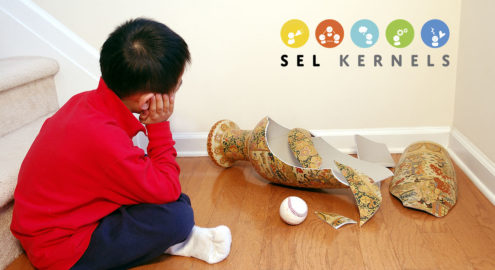
Dear Abby: An SEL Kernels Practice for Sixth Grade

Dear Abby: An SEL Kernels Practice for Fifth Grade

Dear Abby: An SEL Kernels Practice for Fourth Grade

Dear Abby: An SEL Kernels Practice for Third Grade

Dear Abby: An SEL Kernels Practice for Second Grade

Dear Abby: An SEL Kernels Practice for First Grade

Dear Abby: An SEL Kernels Practice for Kindergarten
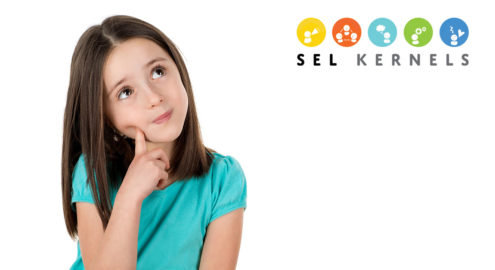
Notes to Self: An SEL Kernels Practice for Sixth Grade

Notes to Self: An SEL Kernels Practice for Fifth Grade

Notes to Self: An SEL Kernels Practice for Fourth Grade

Notes to Self: An SEL Kernels Practice for Third Grade

Notes to Self: An SEL Kernels Practice for Second Grade

Notes to Self: An SEL Kernels Practice for First Grade

Notes to Self: An SEL Kernels Practice for Kindergarten
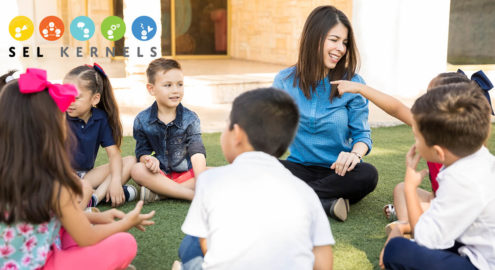
Feelings Circle: An SEL Kernels Practice for Sixth Grade

Feelings Circle: An SEL Kernels Practice for Fifth Grade

Feelings Circle: An SEL Kernels Practice for Fourth Grade

Feelings Circle: An SEL Kernels Practice for Third Grade

Are you ready to build a kinder, happier school where everyone belongs? Join Greater Good Educators! Explore the science of well-being in a supportive community of educators from around the world. Registration is now open for the 2025-2026 school year!


